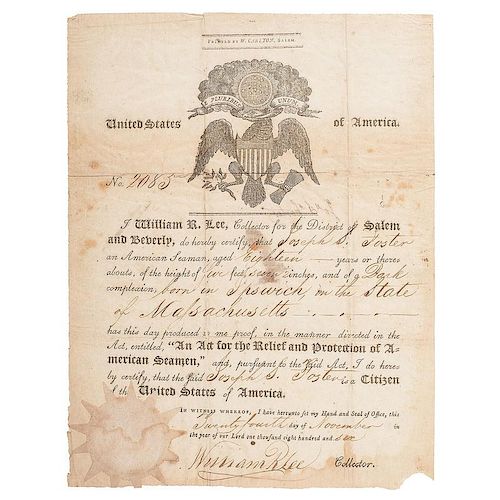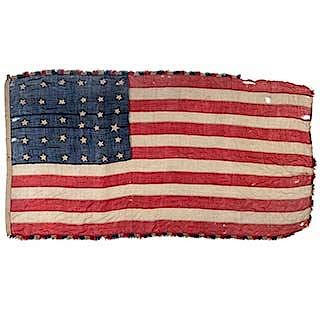Official Seaman's Protection Certificate, Dated 1806
About Seller
6270 Este Ave.
Cincinnati , OH 45232
United States
With offices in Cincinnati, Cleveland and Denver, Cowan’s holds over 40 auctions each year, with annual sales exceeding $16M. We reach buyers around the globe, and take pride in our reputation for integrity, customer service and great results. A full-service house, Cowan’s Auctions specializes in Am...Read more
Two ways to bid:
- Leave a max absentee bid and the platform will bid on your behalf up to your maximum bid during the live auction.
- Bid live during the auction and your bids will be submitted real-time to the auctioneer.
Bid Increments
| Price | Bid Increment |
|---|---|
| $0 | $25 |
| $500 | $50 |
| $1,000 | $100 |
| $2,000 | $250 |
| $5,000 | $500 |
| $10,000 | $1,000 |
| $20,000 | $2,500 |
| $50,000 | $5,000 |
| $100,000 | $10,000 |
About Auction
Nov 17, 2017 - Nov 18, 2017
Cowan's Auctions dawnie@cowans.com
- Lot Description
Lee, William R. Partially printed DS as Customs Collector for the District of Salem and Beverly, 1 p, 7 x 9.25 in., District of Salem and Beverly, Massachusetts. November 24, 1806. Carries serial number 2085 and includes raised seal at lower left.
A document attesting that Joseph S. Foster was an American Seaman and US citizen born in Ipswich, Massachusetts, and not a British citizen as per the "Act for the Relief and Protection of Seamen" of May 28, 1796. This was important because it kept the seamen from being impressed into the British navy off of an American ship, as impressment of US citizens was one of the major causes of the War of 1812 just 6 years later.
Seamen's Protection Certificates were usually printed documents, varying in size and style, and were carried by American seamen as proof of citizenship. The certificate was obtained by the individual through the customhouse, public notary, or US Consul when required in a foreign port. It contained the person's name, birthplace, approximate age, height, skin color, eye and hair color, and other distinctive descriptive information, such as the location of scars or tattoos. "United States of America" was often printed prominently across the top, and the word "protection" might also appear. Small engravings of the American eagle often served to decorate and establish the nationality of the document. A serial number was included on every Customs Protection Certificate for record keeping purposes. The wording of the document was standardized, verbatim from the Act of 1796.
Prior to the Act of 1796, a mariner could obtain a similar document from a public notary. An individual desiring protection was required to bring some authenticated proof of citizenship to the customs collector, who, for a service fee of 25 cents, would issue him a certificate. Most seaman of the day, however, were so transient that they were unable to produce the required proof, and so the condition was altered to allow him to bring a notarized affidavit, instead, in which the seamen and a witness swore to his citizenship. Because it was easy to abuse this system, the Royal Navy did not always honor the Protection Certificates as valid. Collectors were required to keep a record book of the names of individuals receiving protections and send quarterly lists to the State Department. As the threat to American freedom on the high seas began to disappear, Protection Certificates became more valuable as identification, and they were used as such until 1940, when the Seamen's Continuous Discharge Book replaced them.
Bottom right corner of document torn off, with some discoloration and separation at creases. Ink and etching in good shape.Condition
Eliminate the Hassle of Third-Party Shippers: Let Cowan's Ship Directly To You!
If you'd like a shipping estimate before the auction, contact Cowan's in-house shipping department at shipping@cowans.com or 513.871.1670 x219. - Shipping Info
-
Eliminate the Hassle of Third-Party Shippers: Let Cowan's Ship Directly To You!
If you'd like a shipping estimate before the auction, contact Cowan's in-house shipping department at shipping@cowans.com or 513.871.1670 x219.
At the request of the buyer, Cowan's will authorize the shipment of purchased items. Shipments usually occur within two weeks after payment has been received. Shipment is generally made via UPS Ground service. Unless buyer gives special instructions, the shipping method shall be at the sole discretion of Cowan's Auctions, Inc.. Cowan's is in no way responsible for the acts or omissions of independent handlers, packers or shippers of purchased items or for any loss, damage or delay from the packing or shipping of any property.
-
- Buyer's Premium



 EUR
EUR CAD
CAD AUD
AUD GBP
GBP MXN
MXN HKD
HKD CNY
CNY MYR
MYR SEK
SEK SGD
SGD CHF
CHF THB
THB












